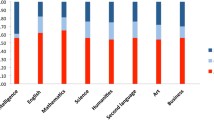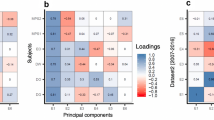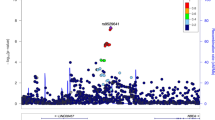Abstract
The genetic and environmental etiology of high math performance (at or above the 85%tile) was examined in a population-based sample of 10-year-old twins (nMZ = 1,279, nDZ = 2,305). Math skills were assessed using a web-based battery of math performance tapping skills related to the UK National Math Curriculum. Probandwise concordance rates and liability threshold models indicated that genetic and shared environmental influences were significant, and that these estimates were generally similar to those obtained across the normal range of ability and did not vary significantly by gender. These results suggest that the genetic and environmental influences at the high end of ability are likely to be continuous with those that affect the entire range of math performance across all children irrespective of gender.

Similar content being viewed by others
References
Akaike H (1987) Factor analysis and AIC. Psychometrika 52(3):317–332
Alarcón M, DeFries JC, Light JG, Pennington BF (1997) A twin study of mathematics disability. J Learn Disabil 30:617–623
Boada R, Willcutt EG, Tunick RA, Chhabildas NA, Olson RK, DeFries JC, Pennington BF (2002) A twin study of the etiology of high reading ability. Read Writ 15:683–707
Davis OSP, Kovas Y, Harlaar N, Busfield P, McMillan A, Frances J, Petrill SA, Dale PS, Plomin R (2008) Generalist genes, specialist environments and the internet generation: etiology of learning abilities using web-based testing at 10 years. Genes Brain Behav 7:455–462
DeThorne L, Petrill SA, Hayiou-Thomas E, Plomin R (2005) Differences in the etiology of low expressive vocabulary: a function of general cognitive ability or severity of language delay? J Speech Lang Hear Res 48(4):792–804
Ericsson KA, Krampe R, Tesch-Romer C (1993) The role of deliberate practice in the acquistion of expert performance. Psychol Rev 100:363–406
Freeman B, Smith N, Curtis C, Huckett L, Mill J, Craig IW (2003) DNA from buccal swabs recruited by mail: evaluation of storage effects on long-term stability and suitability for multiplex polymerase chain reaction genotyping. Behav Genet 33:67–72
Gallagher AM, Kaufman JC (eds) (2005) Gender differences in mathematics: an integrative psychological approach. Cambridge University Press, New York
Geschwind N, Galaburda A (1987) Cerebral lateralization. MIT press, Cambridge
Harlaar N, Butcher L, Meaburn E, Craig IW, Plomin R (2005) A behavioural genomic analysis of DNA markers associated with general cognitive ability in 7-year-olds. J Child Psychol Psychiatry 46:1097–1107
Howe MJA, Davidson JW, Sloboda JA (1998) Innate talents: reality or myth? Behav Brain Sci 21:399–406
Hyde JS (2005) The gender similarites hypothesis. Am Psychol 60:581–592
Hyde JS, Linn MC (2006) Gender similarities in math and science. Science 314:599–600
Hyde JS, Fennema E, Lamon S (1990) Gender differences in mathematics performance: a meta-analysis. Psychol Bull 107:139–155
Kovas Y, Haworth CMA, Petrill SA, Plomin R (2007) Mathematical ability of 10-year-old children: genetic and environmental etiology of normal and low performance. J Educ Psychol 99(1):128–139
McGue M, Bouchard TJ Jr, Iacono WG, Lykken DT (1993) Behavioral genetics of cognitive ability: a lifespan perspective. In: Plomin R, McClearn GE (eds) Nature, nurture, and psychology. American Psychological Association, Washington, DC
Neale MC (1997) Mx: Statistical modeling. Department of Psychiatry, Virginia Commonwealth University, Richmond
Neale MC, Boker SM, Xie G, Maes HH (2002) Mx: Statistical Modeling, 6th edn. Department of Psychiatry, Richmond
nferNelson (2001) Maths 5–14 series. nferNelson Publishing Company Ltd, London
Oliver B, Harlaar N, Hayiou-Thomas ME, Kovas Y, Walker SO, Petrill SA, Spinath FM, Plomin R (2004) A twin study of teacher-reported mathematics performance and low performance in 7-year-olds. J Educ Psychol 96:504–517
Pennington BF, Smith SD (1983) Genetic influences on learning disabilities and speech and language disorders. Child Dev 54:369–387
Petrill SA, Plomin R (2007) Quantitative genetics and mathematical abilities/disabilities. In: Berch D, Mazzocco M (eds) Mathematical learning disabilities: research, theory, and practice. Brookes Publishing, Baltimore
Petrill SA, Saudino K, Cherny SC, Emde RN, Fulker DW, Hewitt JK, Plomin R (1998) Exploring the genetic and environmental etiology of high general cognitive ability in fourteen- to thirty-six-month-old twins. Child Dev 69:68–74
Petrill SA, Johansson B, Pedersen NL, Berg S, Plomin R, Ahern F, McClearn GE (2001) Low cognitive functioning in non-demented 80+ year old twins is not heritable. Intelligence 29:75–83
Plomin R, Kovas Y (2005) Generalist genes and learning disabilities. Psychol Bull 131:592–617
Plomin R, Thompson LA (1993) Genetics and high cognitive ability. In: Bock GR, Ackrill K (eds) The origins and development of high ability. Wiley, Chichester, pp 67–84 (Ciba Foundation Symposium 178)
Plomin R, DeFries JC, McClearn GE, McGuffin P (2001) Behavioral genetics, 4th edn. Worth Publishers, New York
Ronald A, Spinath FM, Plomin R (2002) The aetiology of high cognitive ability in early childhood. High Abil Stud 13:103–114
Rowe DC, Jacobson KC, Van den Oord EJCG (1999) Genetic and environmental influences on vocabulary IQ: parental education level as moderator. Child Dev 70(5):1151–1162
Saudino KJ, Plomin R, Pedersen NL, McClearn GE (1994) The etiology of high and low cognitive ability during the second half of the life span. Intelligence 19:359–371
Scarr S, McCartney K (1983) How people make their own environments: a theory of genotype-environment effects. Child Dev 54:424–435
Sham P (1998) Statistics in human genetics. Edward Arnold, London
Spinath FM, Harlaar N, Ronald A, Plomin R (2004a) Substantial genetic influence on mild mental impairment in early childhood. Am J Ment Retard 109(1):34–43
Spinath FM, Price TS, Dale PS, Plomin R (2004b) The genetic and environmental origins of language disability and ability. Child Dev 75(2):445–454
Stromswold K (2001) The heritability of language: a review and metaanalysis of twin, adoption, and linkage studies. Language 77(4):647–723
Trouton A, Spinath FM, Plomin R (2002) Twins early development study (TEDS): a multivariate, longitudinal genetic investigation of language, cognition and behaviour problems in childhood. Twin Res 5:444–448
Turkheimer E, Haley A, Waldron M, D’Onofrio B, Gottesman II (2003) Socioeconomic status modifies heritability of IQ in young children. Psychol Sci 14(6):623–628
Winner E (2000) The origins and ends of giftedness. Am Psychol 55:159–169
Acknowledgments
Supported by NICHD/IES HD046167.
Author information
Authors and Affiliations
Corresponding author
Additional information
Edited by Claire Haworth.
Rights and permissions
About this article
Cite this article
Petrill, S.A., Kovas, Y., Hart, S.A. et al. The Genetic and Environmental Etiology of High Math Performance in 10-Year-Old Twins. Behav Genet 39, 371–379 (2009). https://doi.org/10.1007/s10519-009-9258-z
Received:
Accepted:
Published:
Issue Date:
DOI: https://doi.org/10.1007/s10519-009-9258-z




